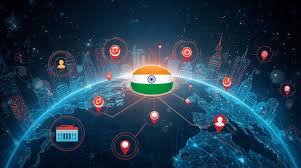Artificial Intelligence and India’s Global Race

- 28 Sep 2025
In News:
Artificial Intelligence (AI) is reshaping the global technological and economic order, influencing sectors from healthcare to defence. For India, AI represents both a transformative development tool and a strategic domain crucial for economic competitiveness and national security.
India’s Position in the Global AI Landscape
India has entered the AI race with significant momentum, backed by a vast digital ecosystem and growing policy support. The government’s India AI Mission, with an outlay of ?10,372 crore, seeks to enhance AI infrastructure, computing power, and research capacity. With over one billion smartphone users and 20 billion monthly UPI transactions, India offers a data-rich environment that can power AI development at scale.
However, compared to the United States ($20 billion) and China ($30 billion) in AI investments during 2024, India’s funding remains modest. While India boasts a talent base of over 18 million software professionals and has integrated AI into school curricula, it still lags in advanced research output and patent generation.
Opportunities for India’s Development
AI holds immense potential to drive India’s socio-economic transformation:
- Healthcare: AI-assisted diagnostics and predictive models can enhance early disease detection, telemedicine outreach, and epidemic forecasting.
- Education: Initiatives like the Bhashini Project enable real-time language translation, improving accessibility and inclusivity in classrooms and governance.
- Agriculture: AI-driven precision farming and weather-based advisories can help small farmers optimise productivity and manage climate risks.
- Finance: Tools such as “Hello UPI” and AI-based fraud detection can deepen rural financial inclusion and strengthen digital security.
- Disaster Management: States like Odisha employ AI in cyclone prediction and geospatial mapping, showcasing AI’s role in saving lives and resources.
Together, these applications align with India’s broader developmental goals of inclusion, sustainability, and resilience.
Challenges in India’s AI Ecosystem
Despite its promise, India faces structural and institutional constraints:
- Infrastructure Deficit: Limited access to high-end GPUs and slow expansion of data centres constrain computational capacity.
- R&D Weakness: India contributes barely 1.4% of global AI research papers and produces less than 2% of global AI PhDs, reflecting a shallow innovation base.
- Regulatory Lag: The outdated IT Act (2000) continues to govern digital activities, lacking provisions for algorithmic transparency, accountability, and data ethics.
- Talent Gap: The focus on short-term certification courses produces surface-level skills rather than deep AI expertise.
- Geopolitical Pressure: The US, EU, and China lead in developing Large Language Models (LLMs), while India risks remaining a consumer market rather than a producer of foundational AI technologies.
Way Forward
A robust AI ecosystem requires a multi-dimensional approach:
- Strengthen Research and Innovation: Enhance public funding for fundamental AI research and incentivise private R&D.
- Human Capital Development: Expand AI training beyond elite institutions and develop teacher capacity for advanced AI pedagogy.
- Regulatory Reforms: Enact a Digital India Act and an AI-specific ethical charter inspired by the EU AI Act, ensuring safety without stifling innovation.
- Public–Private Collaboration: Establish AI innovation hubs focused on healthcare, agriculture, and sustainability.
- Global Partnerships: Engage with international initiatives and leverage India’s leadership in G20 and BRICS to promote responsible AI governance.
Conclusion
India’s AI trajectory stands at a decisive juncture. With its digital depth, demographic advantage, and policy intent, the country can harness AI to drive inclusive growth and global leadership. Yet, without addressing gaps in research, regulation, and ethics, India risks being a user rather than a creator in the AI revolution. Balancing innovation with responsibility will determine whether India can truly emerge as a leading power in the AI-driven century.
